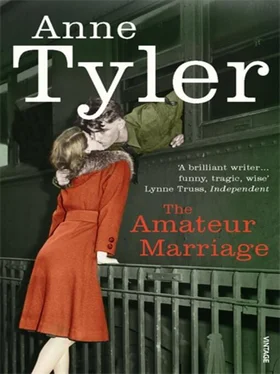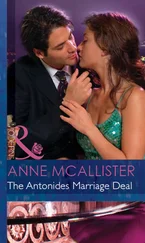Here sat the long-lost Lindy, the central mystery of their lives, the break at the heart of the family, and what were they all doing? Discussing when babies’ eyes changed color. Placing orders for sherry and club soda and ginger ale, and debating a phone call to Jojo though would he in fact be awake yet? Should they postpone it till after lunch?
“I keep thinking we’re just at this normal party,” Karen murmured in George’s ear. “There’s this normal woman guest here, only she happens to be Lindy.” What she said came closest to what George himself was thinking. Wasn’t this too easy? Could Lindy really slip back amongst them so seamlessly?
Now Gina was zeroing in. “Lindy, I have to ask. What kind of medical heritage did Pagan’s father have?”
Lindy said, “Why, I honestly couldn’t… heritage?” She looked around at the others. “He was just a drummer from some little town in Texas. We were never really a couple, I mean not so as you would notice.”
It didn’t seem that Pagan even heard this, or cared if he did hear. He sat comfortably at Gina’s side and watched as she, oh, Lord, opened her button-down nursing flap and hauled out a breast for the baby. “A drummer!” Gina told Pagan, sidetracked at least for the moment from her medical concerns. “That’s where you get your musical talent!”
Pagan said, “Could be,” without much interest.
Sally — too obviously changing the subject — asked why so many holiday wreaths were still up. She said, “How much trouble could it be just to pluck a wreath off a door, I’d like to know?”
“I guess it’s one of those things that people tend to stop seeing,” Lindy’s husband ventured.
“They don’t stop seeing their Christmas trees, do they? They don’t stop seeing their yard decorations! So why is it that a wreath, a simple, lightweight wreath—”
“Oh, Mom. Let them keep their durn wreaths till June, if they want,” Sam said. “Why get all in a swivet about it?”
“Well, I’m just curious, Samantha. I’m certainly not in a ‘swivet.’ I’m just curious about human nature, is all.”
George realized that if he closed his eyes, he could have sworn it was his mother talking.
Speaking of which: over lunch they somehow got to telling “Pauline stories,” as George called them in his head. He wasn’t sure how this tradition had developed — trading reminiscences of his mother’s zanier moments while his father chuckled affably and Anna looked on with a tolerant smile. As a rule George would participate, but today he sat quiet while Karen led off with a description of Mimi Drew’s birthday dinner at Haussner’s — huge old Haussner’s Restaurant with its acres and acres of tables. “It was hosted by a woman Mom had never met,” Karen told Lindy, “and when she got there she found she didn’t know a soul. But she sat down anyhow and started a conversation, till it dawned on her that not even Mimi was there. She thought, Oops, I’m at the wrong party, and right then she spotted Mimi clear across the room, but she was having such a good time that she decided to stay where she was.”
“She was always doing things like that,” Sally said as she passed the lasagna to Lindy. (Who didn’t eat meat either, it turned out.) “Once when we were downtown she gave a dollar to a homeless person, except he wasn’t homeless after all; he was a tenured professor. ‘Madam,’ he said, ‘I’m a tenured professor,’ but Pauline waved a hand and said, ‘Oh, well, keep it anyhow,’ and I said, ‘Pauline…!’ ”
Lindy’s husband gave one of his furry, bearded heh-hehs.
And then the driving stories. The time Pauline got lost in her own alley and the time she confused the brake with the accelerator and the time she backed into a pedestrian, knocked him down, stuck her head out the window, called, “ I’m sorry!” and pulled forward, put her car in reverse, backed up and knocked him down again. It was Sam who told this last tale but it was George who’d lived it, as a mortified fourteen-year-old, and even though it had happened more or less the way she said, somehow it sounded untrue. His mother had not been some fluffy-headed I Love Lucy dingbat; she’d been — at different times — scared and scary, angry, bitter, remorseful, unhappy, jealous, hurt, bewildered, at a loss. He said, “That’s not how it was!” but Sam caroled, “Oh, well, close enough,” and the others went on laughing.
Only Lindy met his eyes, for an instant. Only Lindy seemed to know what he meant. Lindy wasn’t laughing.
Okay, so: must get going, must do this again, must come to our place, blah, blah…
Was that the sum of it?
George stood at the edge of Anna’s front yard and pecked Lindy’s cheek and shook her husband’s hand. With the others, he stood watching as the Falcon bobbed off down the road, high-tailed and rakish and battered. The others were saying, “Wasn’t that nice?” and “Didn’t you think that went well?”
Blah, blah, blah.
What George should have asked, he saw now, was Why did you do it, Lindy? Was it worth it? How terrible could our family have been? What was so important that you had to rip our world apart like that? Doesn’t it ever bother you? Don’t you ever regret it? Did you give us any thought, all those years? Did you wonder about us? Miss us? Did you dream about us at night? Did you ever think you’d been wrong, or selfish, or cruel, or even… wicked?
Wasn’t I enough to keep you here?
Was I so easily forgotten?
How could you have left me, Lindy?
10. The Man Who Was a Dessert
Michael woke from a dream that had the landscape of a fairy tale — soft green hills and valleys, little thread of a road winding toward the horizon. The atmosphere of the dream colored his early morning. Showering, shaving, dressing, eating breakfast with Anna, he imagined wisps of fog clinging to his hair. Anna’s gentle voice traveled toward him across a great distance: She might be home late tonight. They ought to start making Christmas plans. She must remember to call Mollie Picciotto over the weekend.
At 8:45 he drove her to work — a routine that had developed after his retirement. It got him up and forced him out of the house, gave a little shape to his day. Then generally he ran a few errands. This morning he planned to buy window caulking. It was a more entertaining errand than some others. Hearing Anna remark last night upon the draft from the dining-room window, he had felt a quickening of enthusiasm. Now he reviewed the possibilities. Rope putty? Strips of felt? Or should he go for the more professional approach and buy an actual caulking gun? “I’m trusting I’ll find what I need at Schneider’s,” he told Anna. “I’d hate to have to drive to Home Depot.”
Anna said, “Pardon?” and then she said, “I don’t believe you’ve heard a word of what I’ve been saying.”
Hastily, Michael rewound his mental tape recorder. “Calvin,” she had mentioned. That would be her principal. “Problems at school,” he hazarded. “Old Cal acting up again.”
“From nine to three, we’re working nonstop. Even lunch is work, because we’re supposed to eat with the students. But then he expects us to sit through these endless after-school meetings! And this one’s on a Friday, when all any of us can think of is getting back home and collapsing.”
He flicked his turn signal on and took a left at the Maestro School driveway. “Anna,” he said, steering through bare, wanly sunlit woods, “There’s a simple solution. Quit. You are eighty years old. It’s absurd that you’re still teaching.”
“I don’t want to quit,” she told him.
“You and I could be traveling,” he said. He pulled into the packed-earth parking lot and faced her. “We could be spending more time with the grandchildren. You could see more of your daughter.”
Читать дальше












